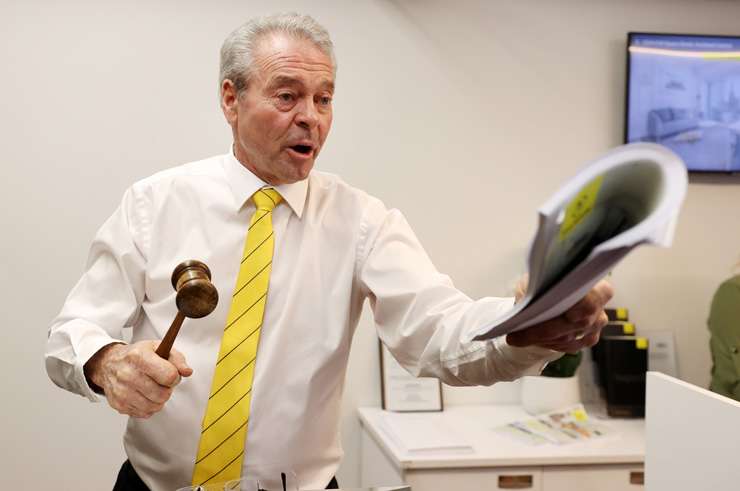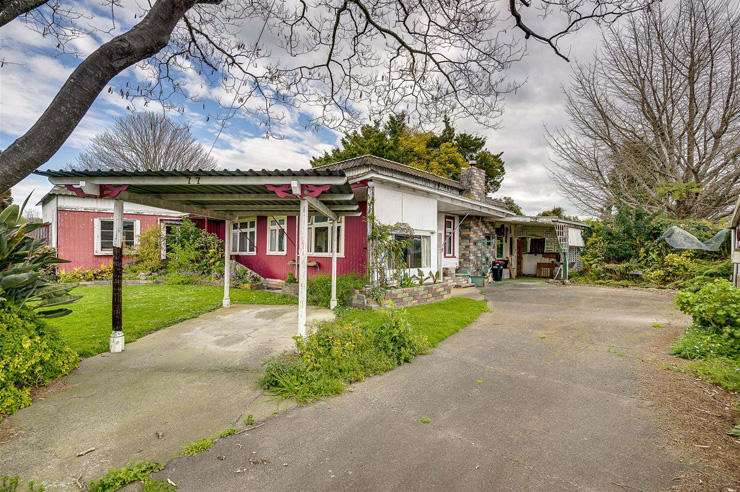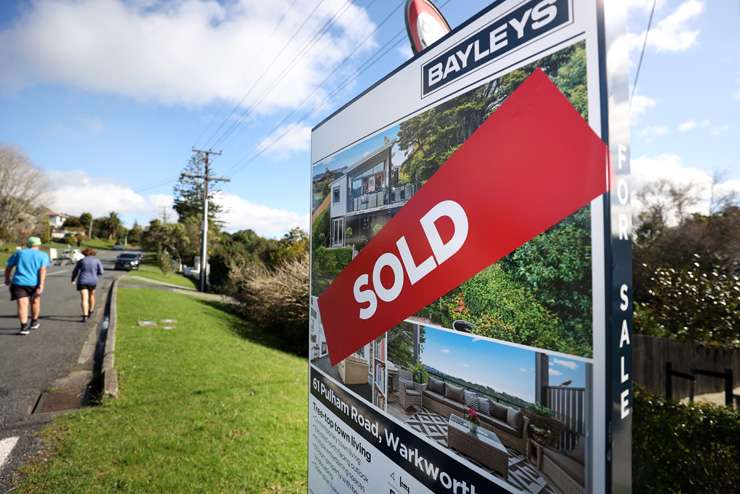One of New Zealand’s leading auctioneers is urging home owners to focus on the auction process rather than the result on the day, claiming it’s still the most effective way of selling a house even in a slowing market.
Gone are the days where almost every property is being sold under the hammer and would be buyers are crammed in a room forced to pay high sums for their dream home – but despite only a third of houses for sale going to auction, Ray White lead auctioneer Sam Steele says auction campaigns still work best.
Steele urges anyone looking to sell their house to look at the evidence when deciding the right method of sale.
“A common perception I hear is that auctions only work in a hot market but in many areas and regions the data shows us that auction can be even more effective in a softening market,” he said.
Start your property search
“Auctions continue to be the most successful method of sale across many of New Zealand's markets as activity and conditions return to pre-Covid levels. In the current market, auction can significantly improve a vendor's chances of selling, while decreasing days on market.”
Nationally almost half of the houses listed by auction at Ray White in the last 30 days were sold during what is considered a 90-day auction campaign and 45% actually sold on auction day.
At Ray White AT Realty in South Auckland, the results are even higher and they have a 61% success rate compared with the 21% success rate when they are sold by any other sale method including listed price, price by negotiation or deadline sale in the same three-month period.

Ray White lead auctioneer Sam Steele stills backs auctions as fastest way to sell. Photo / Supplied
Steele said those listing by auction in South Auckland are almost tripling the vendors chances of selling and also getting the house sold within an average 28 days compared to the other methods which are taking an average 57 days.
While just over half of the houses being put up at auction at Ray White Eastern Group in East Auckland are selling within the 90-day period, which is significantly higher than all the other common sales methods.
Christchurch’s Ray White Metro, where the market has been less affected by the slump and where auction houses across the city are still reporting strong results, is seeing 77% of houses with auction campaigns sell compared with 44%.
And even if the property doesn’t sell at auction, Steele said it is still counted as selling through the auction process within 90 days of being listed and this could be to a conditional buyer after auction day.
“We’ve got properties that have been priced by negotiation and they’ve been sitting there for three or four months and haven’t sold and all the owners are doing are almost chasing the market down where what we are saying is let's put it into a structured campaign where there’s a set deadline and if we can get it sold on the day then that’s great, then if not we are going to lose that momentum to get it sold very quickly afterwards.”

Ray White auctioneer Ted Ingram sets a fast pace for the auctions at Ray White Auckland Central last month. Photo / Fiona Goodall
Often this could result in a conditional offer being made on that property either immediately after the auction or within a few days, he said. Some agents may then put a price on the property or price it by negotiation, but this comes down to the individual agent.
“What we see is if a property goes through an auction campaign the chances of it being sold are considerably higher than anything else.”
However, auctions aren’t as common in all markets and places such as Dunedin or Wellington which favoured other methods such as tenders, he said.
“It’s really down to the culture that’s in that particular marketplace as opposed to what actually works and what doesn’t.”
Steele said all properties worked well at auction, from earthquake-damaged houses being sold for $100,000 to large farms hoping to get tens of millions of dollars.
“There’s no such thing as a non-auction property, it’s just down to the individual owners’ personal situation to be completely honest. The way auction is structured any property can go to auction, it’s just the owner’s preference of how they would like to do it.”
The only additional cost for those selling at auction was the auctioneer’s fee which in Auckland ranges from a few hundred dollars to $800. “It’s a very small investment considering how much more likely you are to get that property sold.”

An asbestos-ridden house in Napier which recently sold at auction for $350,000. Photo / Supplied
Harcourts Hawke’s Bay general manager James Cooper also stands by auctions as a great way to sell a house and has recently seen an increase of sellers wanting to use them.
“It’s a good way to get buyers into a room and buyers taking action.”
It was also a transparent process and the only method that gave buyers the chance to see who they were up against, he said.
“It’s a good way for your property to stand out because it’s in a campaign. A lot of properties just get marketed priced by negotiation and it’s not a campaign and there’s no set deadline as to when the buyers’ need to get their ducks in a row to put their best foot forward on the day because as a vendor you need to create that competition to get that premium price.”
His agency recently sold a run-down property on Murphy Road in Taradale at auction for $350,000. While four buyers registered for the auction, just two people were bidding competitively for it on the day.
Cooper said people often forget auctions are a three-stage process and not just about the auction day. The first stage was the marketing leading up to the auction, the second stage was the auction and if it didn’t sell then the third stage was talking to the conditional buyers
“There’s an intense period of four weeks where there’s a lot of work done to get buyers in the room and then if it doesn’t sell on the day, that’s not a failure at all, you just go to the next stage.

A sold sticker dominates a for sale sign outside a house in Auckland. Photo / Fiona Goodall
“What we find is a lot of properties that go through auction campaigns get some action either through the campaign on auction day or quite quickly after the auction date instead of having these properties sit round for a long period of time and obviously buyers start thinking there is something wrong with the property and there’s not.”
But Mortgage Managers mortgage adviser Stuart Wills said he personally wouldn’t be selling his house by auction at the moment because it ruled out too many buyers.
Wills said first home buyers usually needed an independent valuation to secure a loan and if going to auction this meant spending anywhere between $800 to $1200 on one for a house that they may not even end up buying.
Even people looking to trade up houses might shy away from buying at auctions because they did not want to buy a new house unless they knew they could sell their current house first so needed a conditional sale, he said
“An auction works if you get enough people to the auction, but if you’ve got one person there and they put an opening bid in then that one person is unlikely to go up as high if there was competition.”
Wills said auctions are just one options and deadline sales and price by negotiation should also be considered.
“I say to all my clients look at all the other options too. By negotiation means that somebody can put an offer on their house subject to selling their place or subject to getting the finance approved so there’s more potential buyers I guess, but there’s also more potential for them to slot out of it as well.”














































